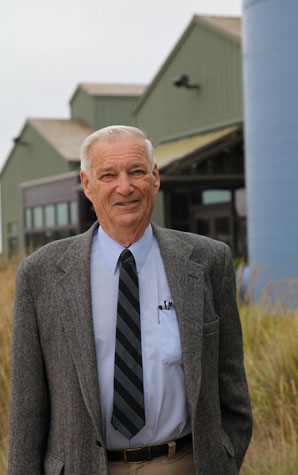UC Santa Cruz Professor Emeritus of Biology Bill Doyle knows what it’s like to grow up hard.
He spent his elementary school summers helping to support his family by picking carrots and potatoes in the fields near Soledad, working on ranches, and at a grain warehouse. He had a newspaper route, too.
In high school, he packed apples and tomatoes, and worked the berry fields of Watsonville. For a time, he and his mother and one of his three siblings lived in a modified laundry shed behind a house on California Street.
But the now-82-year-old founder and long-term director of the UCSC Institute of Marine Sciences, said even though times were tough, those years—especially the ones at Watsonville High—became “the basic, grounding platform” of his life.
Find the potential
From teachers and coaches he learned the importance of working to a person’s potential, the value of teamwork, and the way education should open minds and unlock abilities. He carried those skills through his long career at the university, where he served as chair of the Campus Planning Committee on Marine Studies, dean of the Division of Natural Sciences, chair of the Department of Biology, and also as deputy and acting provost during the early development of Oakes College.
On May 18, Doyle will be inducted into the Watsonville High School Alumni Hall of Fame during a special school assembly at the Henry J. Mello Center for the Performing Arts.
“Bill Doyle was selected for all he has done,” said Peggy Ernst, chair of the Watsonville High Hall of Fame Committee.
Early shame
When Doyle arrived at Watsonville High in the fall of 1944, he was ashamed—not of his poverty—but that his parents were divorced during an era when intact families were the norm. He worried he wouldn’t fit in at a school that was much larger than the ones he had attended. Instead, he found a group of accepting students and supportive teachers who pushed their charges to learn to their full potential, allowing him to discover abilities he didn’t know he had.
“They made you reflective,” Doyle said of his teachers in those years. “They used education to open doors, not close them.”
The skinny, 6-foot-1 Doyle also played on the school’s football and basketball teams where he absorbed the lessons of working together.
“I learned to listen well to people and find out what they think,” said Doyle. When he chaired academic committee meetings at UCSC, for instance, he never started with the words, “this is what I want to get done.” He urged discussion, the development of a shared vision.
Teachers' influence
It was that experience with teachers who helped and supported him—both in high school and at the university level—that prompted Doyle to consider education as a career. He confessed, however, that he toyed with the idea of being a professional musician after his high school music teacher exposed him to the beauty of the French horn—because there were already too many trumpets and saxophones in the band.
Those lessons, about the value of education, along with his work in the fields alongside the financially and educationally disadvantaged, prompted him to accept the invitation of Herman Blake and Rafael Guzman to leave Cowell College and join the nascent Oakes College in 1971.
The college, they told him, would serve as a springboard for those from different ethnic and socioeconomic backgrounds. They also stressed the need for those same students to return to their communities as professionals in science, medicine and technology. After talking with his wife, Doyle said “yes.”
Research continues
Doyle’s research continues in retirement. Publications include five botanical books, one of which was translated into Spanish for use in Mexico and another into Sinhala and Tamil by the Ceylon—now Sri Lanka—government for use in that country. He has also written a book on early campus development and 32 articles in scientific journals.
The work he has done for UCSC and marine science, along with his rise from field worker to professor, is an inspiration to the current crop of students at Watsonville High, Ernst said.
“He will be a real example to our students about what they can accomplish if they want to,” she said.
Watsonville High names UCSC’s Bill Doyle to alumni hall of fame



